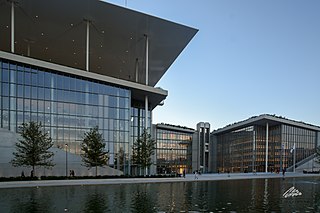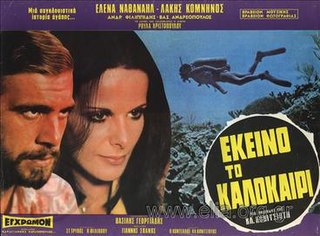
Odysseas Elytis was a Greek poet, man of letters, essayist and translator, regarded as the definitive exponent of romantic modernism in Greece and the world. He is one of the most praised poets of the second half of the twentieth century, with his Axion Esti "regarded as a monument of contemporary poetry". In 1979, he was awarded the Nobel Prize in Literature.

Zakynthos or Zante is a Greek island in the Ionian Sea. It is the third largest of the Ionian Islands, with an area of 405.55 km2 (156.6 sq mi), and a coastline 123 km (76 mi) in length. The name, like all similar names ending in -nthos, is pre-Mycenaean or Pelasgian in origin. In Greek mythology the island was said to be named after Zacynthus, the son of the legendary Arcadian chief Dardanus.

Markos Botsaris was a Souliot chieftain, general of the Greek revolutionary army and hero of the Greek War of Independence. He played a key role in relieving the First Siege of Missolonghi in 1822–1823 and was awarded the title of General of Western Greece by the revolutionary Greek government. He was killed during the Battle of Karpenisi and was buried in Missolonghi with full honors. Today Botsaris is among the most revered national heroes in Greece.

Nikos Dimou is a Greek writer and columnist and copywriter.
Marinos Antypas was a Greek lawyer, journalist, and critic who was one of the country's first socialists. He founded publications who were shuttered, was repeatedly arrested for his social criticism, and eventually, assassinated.

Vasilis Michaelides is considered by many and often referred to as the national poet of Cyprus.
Maro Douka is a Greek novelist. She has lived in Athens since 1966 and she studied History and Archaeology at the University of Athens. She belongs to the so-called Genia tou 70, which is a literary term referring to Greek authors who began publishing their work during the 1970s; her debut work, Η Πηγάδα, based on her imprisonment in 1967 by the Military Junta, was published in 1974, just a few months after the Metapolitefsi.
Katerina Anghelaki-Rooke was a Greek poet, translator and lecturer.

Modern Greek literature is literature written in Modern Greek, starting in the late Byzantine era in the 11th century AD. It includes work not only from within the borders of the modern Greek state, but also from other areas where Greek was widely spoken, including Istanbul, Asia Minor, and Alexandria.
Sappho Leontias was a Cypriot writer, feminist, and educator.

The Pamphlet of Rigas Feraios is a large chalcography printed in Vienna in 1797 by Rigas Feraios. It depicts a portrait of Alexander the Great framed by war scenes and portraits of his generals. The etching was incised by François Müller, who cooperated with Rigas for his cartographic work which he published the same year: Rigas' Map of Greece (1797), the New Map of Wallachia and part of Transylvania (1797) and the General Map of Moldavia (1797). It was released in 1200 copies from the printing press of Nitsch. One of the two copies that have been discovered in Greece is displayed in the National Historical Museum of Greece.
Menelaos Lountemis was the pen name one of the most important essayists in the Greek interwar period and post-World War II era. His pen name was inspired by his later homeland's river Loudias.
ElisavetSpathari is a Greek archaeologist and author. She is Honorary Director Emeritus of Ministry of Culture in Greece and has written several books about Ancient Greece.

Eleni Vakalo was a Greek poet, art critic and art historian.
Kleitos-Dimitrios Kyrou was a Greek poet and translator. He was born in Thessaloniki and he studied at Anatolia College. In 1939, he entered the Law School of the Aristotle University of Thessaloniki. He worked in banking between 1951 and 1983, and he was General Secretary of the National Theatre of Northern Greece between 1974 and 1976.
Tasos Leivaditis was a Greek poet, short story writer and literary critic who belonged to the postwar generation that was deeply marked by the struggles and failures of the communist movement. His early and politically committed poetry travelled through the ‘fire and sword’ of history, transforming in the end into powerful and paradoxical prose-poems, and displaying an erotically charged form of ‘neo-romanticism’ mixed with ‘melancholic minimalism’ where “genuine humility offers obeisance to the magic of language.”

Ekeino to kalokairi is a 1971 Greek film starring Elena Nathanael and Lakis Komninos. It won the photography and music prizes at the 1971 Thessaloniki Festival of Greek Cinema. It was the Greek version of the successful 1970 American film Love Story. The film was one of the greatest successes of Elena Nathanael and the music of its soundtrack "haunted all the teenage parties of the 1970s". Its soundtrack features the hit song "San Me Koitas" which has been described as "one of the most beautiful erotic songs of all time".

Zisis Oikonomou, also spelled Zisis Economou, was a Greek poet and prose writer. In 1977 he received the poetry award from the Academy of Athens for all his work and especially for his book Cloudless Silence. In 1995, he was honoured with the Greek National Prize of Poetry.

Katerina Sakellaropoulou is a Greek judge who has been the president of Greece since 13 March 2020. She was elected by the Hellenic Parliament to succeed Prokopis Pavlopoulos on 22 January 2020. Prior to her election as president, Sakellaropoulou served as president of the Council of State, the highest administrative court of Greece. She is the country's first female president.
Konstantinos Koumas was a Greek 'Teacher of the Nation', a pioneer of the Modern Greek Enlightenment, a historian, philosopher and translator of literary works.











